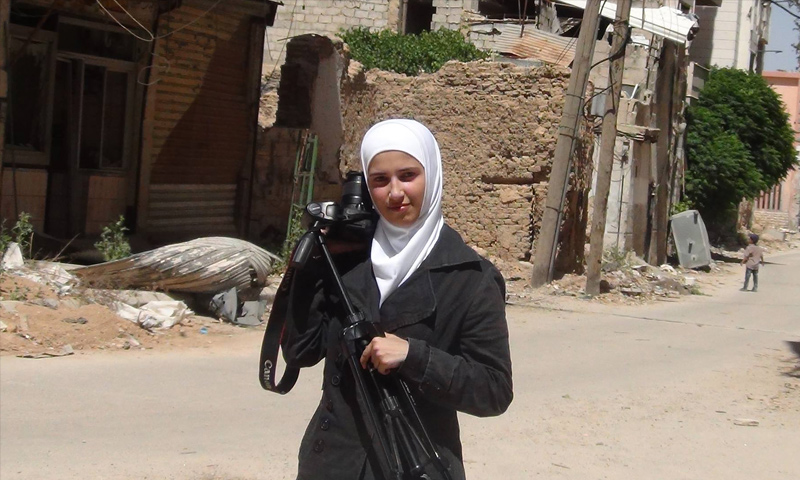Wednesday May 3rd was World Press Freedom Day, as declared by the United Nations General Assembly in 1993 after being adopted by UNESCO’s General Conference in 1991.
This international day evokes the violations committed against freedom of expression by journalists in general, and by Syrian journalists in particular, who have been exposed to various risks and difficulties in their quest to report on news and events in Syria and document violations against civilians.
Since the beginning of the Syrian revolution, journalism in Syria has not been a purely male pursuit. Female journalists have played a major fundamental role in all types of news coverage.
In this report, Enab Baladi presents the most prominent Syrian female journalists who have “experienced” the Syrian revolution through media and the press since its beginning in 2011.
Zaina Erhaim (Idlib)
Zaina Erhaim was born in Idlib in 1983 and graduated from the Faculty of Media at Damascus University in 2007.
She started her journalistic career at the Syria News website in 2004 before moving to work with the Orient channel since the establishment of its office in Damascus, where she remained until it was shut down by Syrian intelligence services in 2008. She later moved to work with Al Hayat newspaper in London.
In the first year of the revolution, she participated in several field assignments, which led to her arrest by the Syrian regime in 2012.
Erhaim contributed to the establishment of Local Coordination Committees’ media office. She also trained around 100 Syrian journalists and activists, one third of whom are women.
She was awarded the Reporters Without Borders Prize in 2015. The organizers explained that the choice was based on “her behavior, determination, courage and ability to focus on the humanitarian aspect in the war, especially as her country is one of the most difficult working locations for journalists”.
She also won two international awards in 2015 for her journalistic work and courage in training young leaders in areas outside Syrian regime control.
Lina Shamy: From Idlib to Aleppo
A Syrian activist and architect from Idlib, Lina Shamy started her journey in the media field from the eastern neighborhoods of Aleppo during the siege by al-Assad forces and supporting militias lasting more than three years.
During her press coverage of daily events in Aleppo, Shamy focused on short video recordings in English, and some in Arabic.
She appeared on foreign and Arab channels on an almost daily basis during the military campaign against the city of Aleppo to provide thorough humanitarian and field coverage of what was happening in the eastern neighborhoods of Aleppo, including bombing and air raids carried out by the Syrian regime and its Russian ally.
During the final agreement to evacuate the eastern neighborhoods of Aleppo, Lina left the city to settle in Idlib.
She currently covers daily bombings and air attacks on civilians through her official Twitter and Facebook accounts.
Kholoud Helmi: Documenting Events in Darayya
Kholoud Helmi was born in Darayya in 1984 and is one of the founders of Enab Baladi newspaper, where she still works as an editor. She founded the newspaper’s news section and network of correspondents. She holds a master’s degree in interpreting from Damascus University (2010).
In March 2016, she won the annual Anna Politkovskaya Award from the human rights organization “Reach All Women in War” (RAW in WAR) on October 7, 2015, in recognition of her “tireless” work on reporting the truth about what is taking place in Syria.
Helmi has participated in covering events in Darayya since the first year of the revolution. She also documented the abuses committed by al-Assad forces in the city, including the Great Massacre, which lasted for three days in 2012.
In addition, she has played a major role in peaceful mobilization and protests against the Syrian regime in the city of Darayya.
Samara al-Quatli (Eastern al-Ghouta)
An activist and journalist originally from Douma, al-Quatli worked as a correspondent for the Qatari channel Al Jazeera in Eastern al-Ghouta. Throughout the years of the siege on towns in the eastern countryside of Damascus, she has covered humanitarian issues and developments on the battlefield in most of Eastern al-Ghouta on a daily basis.
She is known for her presence on the ground during air strikes on the residential neighborhoods of Eastern al-Ghouta and for her television reports “from the field”, unlike some Syrian female journalists whose work is limited to covering social and humanitarian aspects.
Al-Quatli was repeatedly threatened by the Jaysh Al-Islam (Brigade of Islam) faction, which is active in Eastern al-Ghouta. Her mother was arrested for reasons that she says were “unknown”.
However, Enab Baladi’s sources point out that Jaysh Al-Islam refused to give her any military or field information during her stay in Eastern al-Ghouta, which led to “sensitivities” between the two sides.
Al-Quatli left Eastern al-Ghouta for the Turkish city of Gaziantep due to the recent threats she received. She is still working as a correspondent for Al Jazeera covering events in Syria.











